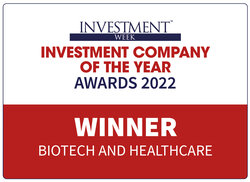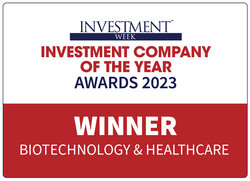Polar Capital Global Healthcare Trust plc (the "Company"): The Company is an investment company with investment trust status and its shares are excluded from the Financial Conduct Authority’s (“FCA”) restrictions on the promotion of non-mainstream investment products. The Company conducts its affairs, and intends to continue to conduct its affairs, so that the exemption will apply.
The Company is an Alternative Investment Fund under the EU's Alternative Investment Fund Managers Directive 2011/61/EU as it forms part of UK law by virtue of the European Union (Withdrawal) Act 2018.
The Investment Manager: Polar Capital LLP is the investment manager of the Company (the "Investment Manager"). The Investment Manager is authorised and regulated by the FCA and is a registered investment adviser with the United States' Securities and Exchange Commission.
Key Risks
- Investors' capital is at risk and there is no guarantee the Company will achieve its objective.
- Past performance is not a reliable guide to future performance.
- The value of investments may go down as well as up.
- Investors might get back less than they originally invested.
- The value of an investment’s assets may be affected by a variety of uncertainties such as (but not limited to): (i) international political developments; (ii) market sentiment; and (iii) economic conditions.
- The shares of the Company may trade at a discount or a premium to Net Asset Value.
- The Company may use derivatives which carry the risk of reduced liquidity, substantial loss and increased volatility in adverse market conditions.
- The Company invests in assets denominated in currencies other than the Company's base currency and changes in exchange rates may have a negative impact on the value of the Company's investments.
- The Company invests in a concentrated number of companies based in one sector. This focused strategy can lead to significant losses. The Company may be less diversified than other investment companies.
- The Company may invest in emerging markets where there is a greater risk of volatility than developed economies, for example due to political and economic uncertainties and restrictions on foreign investment. Emerging markets are typically less liquid than developed economies which may result in large price movements to the Company.
Important Information
Not an offer to buy or sell: This document is not an offer to buy or sell or a solicitation of an offer to buy or sell any security, and under no circumstances is it to be construed as a prospectus or an advertisement. This document does not constitute, and may not be used for the purposes of, an offer of the securities of, or any interests in, the Company by any person in any jurisdiction in which such offer or invitation is not authorised.
Information subject to change: Any opinions expressed in this document may change.
Not Investment Advice: This document does not contain information material to the investment objectives or financial needs of the recipient. This document is not advice on legal, taxation or investment matters. Prospective investors must rely on their own examination of the consequences of an investment in the Company. Investors are advised to consult their own professional advisors concerning the investment.
No reliance: No reliance should be placed upon the contents of this document by any person for any purposes whatsoever. None of the Company, the Investment Manager or any of their respective affiliates accepts any responsibility for providing any investor with access to additional information, for revising or for correcting any inaccuracy in this document.
Performance and Holdings: All data is as at the document date unless indicated otherwise. Company holdings and performance are likely to have changed since the report date. Company information is provided by the Investment Manager.
Benchmark: The Company is actively managed and uses the MSCI All Country World Index/Healthcare as a performance target. The benchmark is considered to be representative of the investment universe in which the Company invests. The performance of the Company is likely to differ from the performance of the benchmark as the holdings, weightings and asset allocation will be different. Investors should carefully consider these differences when making comparisons. Further information about the benchmark can be found at: www.mscibarra.com.
Third-party Data: Some information contained in this document has been obtained from third party sources and has not been independently verified. Neither the Company nor any other party involved in compiling, computing or creating the data makes any warranties or representations with respect to such data, and all such parties expressly disclaim all warranties of originality, accuracy, completeness, merchantability or fitness for a particular purpose with respect to any data contained within this document.
Country Specific Disclaimers
United States: The information contained within this document does not constitute or form a part of any offer to sell or issue, or the solicitation of any offer to purchase, subscribe for or otherwise acquire, any securities in the United States or in any jurisdiction in which such an offer or solicitation would be unlawful. The Company has not been and will not be registered under the United States Investment Company Act of 1940, as amended (the “Investment Company Act”) and, as such, the holders of its shares will not be entitled to the benefits of the Investment Company Act. In addition, the offer and sale of the Securities have not been, and will not be, registered under the U.S. Securities Act of 1933, as amended (the “Securities Act”). No Securities may be offered or sold or otherwise transacted within the United States or to, or for the account or benefit of U.S. Persons (as defined in Regulation S of the Securities Act). In connection with the transaction referred to in this document the shares of the Company will be offered and sold only outside the United States to, and for the account or benefit of non-U.S. Persons in “offshore- transactions” within the meaning of, and in reliance on the exemption from registration provided by Regulation S under the Securities Act. No money, securities or other consideration is being solicited and, if sent in response to the information contained in this document, will not be accepted. Any failure to comply with the above restrictions may constitute a violation of such securities laws.
Further Information about the Company: Investment in the Company is an investment in the shares of the Company and not in the underlying investments of the Company. Further information about the Company and any risks can be found in the Company’s Key Information Document, the Annual Report and Financial Statements and the Investor Disclosure Document which are available on the Company's website, found at: https://www.polarcapitalglobalhealthcaretrust.co.uk





Fund Manager Commentary As at 28 November 2025
Market review
Global equity markets were broadly flat in November. Beneath the headline performance, however, sector returns diverged significantly. Information technology (IT) stocks posted negative returns as investors started to price in higher earnings volatility after a period of exponential AI capex investment. The rotation out of IT names likely benefitted the healthcare sector which was the best performer in the month. Within healthcare, pharmaceuticals, supplies, distribution and biotechnology had a particularly strong month, whereas healthcare information technology and managed care were the only subsectors that ended the month in negative territory.
In the US, the macroeconomic data flow remained partially constrained by the government shutdown which concluded in the second week of November. The limited statistics available portray a relatively stable environment: the unemployment rate held at 4.3%, retail sales and PMI surveys were solid and producer price inflation did not accelerate. A December rate cut is now widely expected, following comments from Governor Waller suggesting that labour market conditions have softened sufficiently to justify a more accommodative stance. However, in the absence of more detailed data, uncertainty persists regarding the longer-term trajectory of the Federal Reserve’s policy rate.
Turning to healthcare, another ‘deal’ was struck between the US administration and the pharmaceutical industry. This time, Novo Nordisk and Eli Lilly entered negotiations, reaching an accord that echoed those previously concluded with Pfizer* and AstraZeneca. Both companies agreed to implement ‘most-favoured nation’ (MFN) prices for certain drugs within the Medicaid population, to commit to substantial new US manufacturing investments and, more importantly, to significantly lower the cost of their diabetes and obesity GLP-1 drugs in the government-sponsored and the direct-to-consumer channels. In exchange, Eli Lilly and Novo Nordisk will receive a three-year exemption from pharmaceutical tariffs and the government will launch a pilot programme in 2026 to provide Medicare coverage for obesity treatments for eligible beneficiaries. The agreement reduces two of the largest barriers to adoption of these drugs, namely cost and lack of coverage, but it is too early to say whether higher volumes will be enough to offset the lower prices and ultimately to assess the impact the deal will have on Novo Nordisk and Eli Lilly’s earnings.
Fund performance
The Company’s NAV increased by 8.4% in November, ahead of its benchmark, the MSCI All Country World Daily Net Total Return Health Care Index, which was up 6.9% for the month (both figures in sterling terms).
Positive contributors relative to the benchmark in November were Exact Sciences, Teva Pharmaceutical Industries and NeuroPace.
After a period of good performance, Exact Sciences was the beneficiary of a $105/share acquisition proposal from Abbott Laboratories.
Teva Pharmaceutical Industries’ performance was the result of two things. The first was a period of solid commercial executions and the second was greater clarity on the near-term pricing landscape for key branded drug Austedo XR for the treatment of tardive dyskinesia.
NeuroPace’s strong performance was driven by good financials and guidance coupled with better-than-expected reimbursement rates for its novel epilepsy treatment.
Negative relative contributors in the period under review were Merck, Fresenius and Lundbeck.
The Fund had no exposure to Merck, which delivered positive clinical news flow, the catalyst for a valuation rerating off a relatively low base.
There was no thesis changing news for either Fresenius or Lundbeck, both of which lagged strong healthcare sector performance following several months of positive share price appreciation.
We added positions in Chugai Pharmaceutical, Guardant Health, Regeneron Pharmaceuticals and Roivant Sciences.
A key driver behind the decision to invest in Japanese pharmaceuticals company Chugai Pharmaceutical is the fact that the company is set to receive a tiered royalty from Eli Lilly on global sales of its oral obesity medication orforglipron. If Eli Lilly has a strong launch, then there could be upwards pressure on Chugai Pharmaceutical’s near and medium-term earnings.
Guardant Health, one of the leaders in precision oncology and cancer screening, could benefit from a number of growth drivers in 2026 and beyond, adding to the positive momentum generated in 2025.
US biotechnology company Regeneron Pharmaceuticals was added to the portfolio with the rationale being one of positive earnings revisions coupled with the expectation for a raft of news flow in the coming months that could add greater conviction to the company’s long-term revenue growth.
US biotechnology company Roivant Sciences could benefit from several catalysts in the coming months, including potential product approvals and launch trajectories, all at an attractive valuation.
The new positions were funded, in part, by the exit from Exact Sciences following the news that Abbott Laboratories is looking to acquire the company.
Outlook
Driven by high levels of innovation, new product cycles, ongoing demand for products and services and an easing political backdrop in the US, the healthcare sector is starting to turn. Absolute and relative performances have started to pick up and there are also early signs of positive ETF inflows which bodes well for continued, positive momentum. As long as the industry continues to develop innovative products and to deliver commercial excellence that drives positive revenue and earnings revisions, the positive momentum could be sustained in the near and medium term.
*not held
James Douglas
James studied medicinal chemistry and has worked in healthcare, in sales, research and fund management, throughout his career
Gareth Powell
Gareth worked at a pharmaceutical company and in academic laboratories before setting up the healthcare team in 2007
Historical Fact Sheets